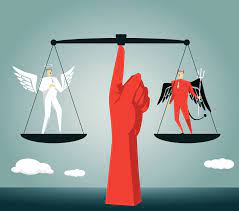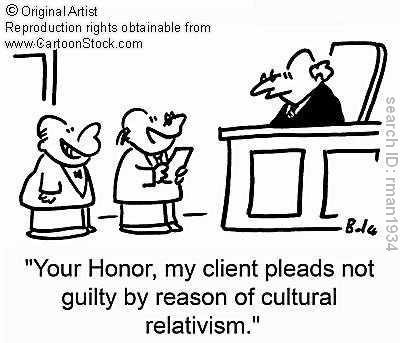
Sophie Rapeepat | Writer
22 May 2023
Morality is defined as the principles concerning the distinction between right and wrong or good and bad behavior. For most people, the first thing that comes to mind is the concept of absolute morality, meaning that what is right and wrong is definitive and universal. However, the rules are not black and white, and much of what we believe is right and wrong comes down to the individual and the circumstance.
Picture a society in which everyone can agree that stealing is wrong. The rules seem pretty absolute: Just don’t steal. But what if the person stealing is a desperate mother trying to get bread for her starving child? Suddenly, the idea of a moral code clashes with the complexity of human survival and needs. For some, the actions of the mother still might be considered wrong no matter the circumstances; however, many others would justify the stealing as an exception since she had no other choice. But to what extent can the rules of morality be bent, and who decides when something is right or wrong?
In the cases like this where rules conflict, a paradox of moral quandaries is created. Everyone knows that murder is wrong, but what if killing one person prevented the death of three others? Obviously, it makes sense to sacrifice one for the majority, but how would you decide who should live and who should die? What if the one that had to die was a child? Would their life be less valuable if they were a criminal instead? The truth is that the definition of what is right and wrong changes with our individual perspectives and values. When two moral ideas clash, the illusion of absolutism in morality dissolves, and the definition of right and wrong lies in cultural bias and moral relativism instead.

Our world is diverse, and different people have different morals depending on their experiences. For instance, polygamy in many cultures is condemned, but for some people, it is morally acceptable. In a scenario like this, people may disapprove of foreign practices, but do they have the right to speak out in opposition? In an effort to demonstrate a more extreme example, consider a hypothetical culture in which battery acid is poured into the eyes of girls on their tenth birthday. Does the justification of tradition or religion really excuse the obvious immoral actions of the practice? The rules of morality are relative to an extent, but at what point do individual morals become irrelevant, and something is collectively decided as “wrong”?
Philosophers have spent centuries studying the effects of morality in society. “I think it’s hard to define right from wrong since our perceptions grow and change as we experience different things,” reflects sophomore Tess Clark. “Individual values develop as we learn, so each person will have a different set of beliefs unique to only them.”
With so many individual experiences, it’s honestly mind-blowing to see how people have agreed on certain parameters of morality. For instance, consider the controversy surrounding the statement, “Laws are the codified morality of society.” With this mindset, laws are put into place as a reflection of what people believe should be societally enforced as right and wrong. Though law and morals are definitely related, we’ve already discussed how morality is too fluid and indefinable to be written into code. Many people consider smoking or cheating on spouses immoral, but does that mean those actions should be condemned with the threat of penalty?
Agreeing would imply that each law made is moral. That belief would then imply that breaking laws is therefore immoral. But does that mean that every jaywalker is wrong simply because they don’t care about or agree with a specific inconsistent law? According to junior Josie Burke, “Morality definitely influences behavior and societal standards, but it’s too inconsistent to base official laws off of. A lot of immoral things are legal, but just because there are no consequences for them does not mean that they are right.”
The rules of morality are ever-changing. What is considered “right” or “good” to some, may be condemned to others. At the end of the day, the only option left is to use balanced judgment and reasoning to make decisions. People will never fully agree on what is morally acceptable, so just do what you want and live life as you see fit.

Leave a Reply